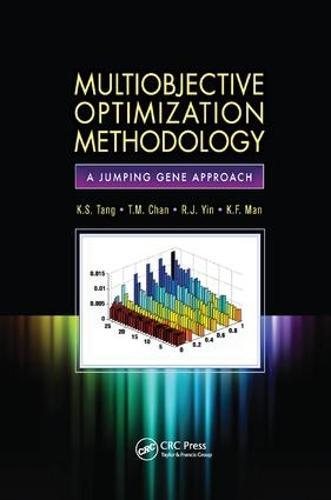Overview
The first book to focus on jumping genes outside bioscience and medicine, Multiobjective Optimization Methodology: A Jumping Gene Approach introduces jumping gene algorithms designed to supply adequate, viable solutions to multiobjective problems quickly and with low computational cost. Better Convergence and a Wider Spread of Nondominated Solutions The book begins with a thorough review of state-of-the-art multiobjective optimization techniques. For readers who may not be familiar with the bioscience behind the jumping gene, it then outlines the basic biological gene transposition process and explains the translation of the copy-and-paste and cut-and-paste operations into a computable language. To justify the scientific standing of the jumping genes algorithms, the book provides rigorous mathematical derivations of the jumping genes operations based on schema theory. It also discusses a number of convergence and diversity performance metrics for measuring the usefulness of the algorithms. Practical Applications of Jumping Gene Algorithms Three practical engineering applications showcase the effectiveness of the jumping gene algorithms in terms of the crucial trade-off between convergence and diversity. The examples deal with the placement of radio-to-fiber repeaters in wireless local-loop systems, the management of resources in WCDMA systems, and the placement of base stations in wireless local-area networks. Offering insight into multiobjective optimization, the authors show how jumping gene algorithms are a useful addition to existing evolutionary algorithms, particularly to obtain quick convergence solutions and solutions to outliers.
Full Product Details
Author: K.S. Tang (City University of Hong Kong, China) ,
T.M. Chan (City University of Hong Kong, China) ,
R.J. Yin (City University of Hong Kong, China) ,
K.F. Man (City University of Hong Kong, China)
Publisher: Taylor & Francis Ltd
Imprint: CRC Press
Weight: 0.520kg
ISBN: 9781138072558
ISBN 10: 1138072559
Pages: 280
Publication Date: 09 March 2018
Audience:
College/higher education
,
General/trade
,
Tertiary & Higher Education
,
General
Format: Paperback
Publisher's Status: Active
Availability: In Print

This item will be ordered in for you from one of our suppliers. Upon receipt, we will promptly dispatch it out to you. For in store availability, please contact us.
Reviews
This is an interesting and practical book. It is easy to read [and] provides good background information ... [and] cutting-edge technologies to solve the challenging multi-objective optimization problems. -Mo-Yuen Chow, North Carolina State University, Raleigh, USA The authors describe the jumping gene approach to solve multiobjective optimization problems. It is quite [a] new approach and complements standard operations used in genetic algorithms. -Marcin Anholcer (Poznan), Zentralblatt MATH 1273
Author Information
Kit Sang Tang received his BSc from the University of Hong Kong in 1988 and his MSc and PhD from City University of Hong Kong in 1992 and 1996, respectively. He is currently an associate professor in the Department of Electronic Engineering at City University of Hong Kong. He has published over 90 journal papers and five book chapters, and coauthored two books, focusing on genetic algorithms and chaotic theory. Tak Ming Chan received his BSc in applied physics from Hong Kong Baptist University in 1999 and his MPhil and PhD in electronic engineering from City University of Hong Kong in 2001 and 2006 respectively. He was a research associate in the Department of Industrial and Systems Engineering at the Hong Kong Polytechnic University from 2006 to 2007 and a postdoctoral fellow in the Department of Production and Systems Engineering, University of Minho, Portugal from 2007 to 2009. Richard Jacob Yin obtained his BEng in Information Technology in 2004 and his PhD in Electronic Engineering in 2010 from the City University of Hong Kong. He is now an Electronic Engineer at ASM Assembly Automation Hong Kong Limited. Kim Fung Man is a Chair Professor and head of the electronic engineering department at City University of Hong Kong. He received his PhD from Cranfield Institute of Technology, UK. He is currently the co-editor-in-chief of IEEE Transactions of Industrial Electronics. He has co-authored three books and published extensively in the area.



